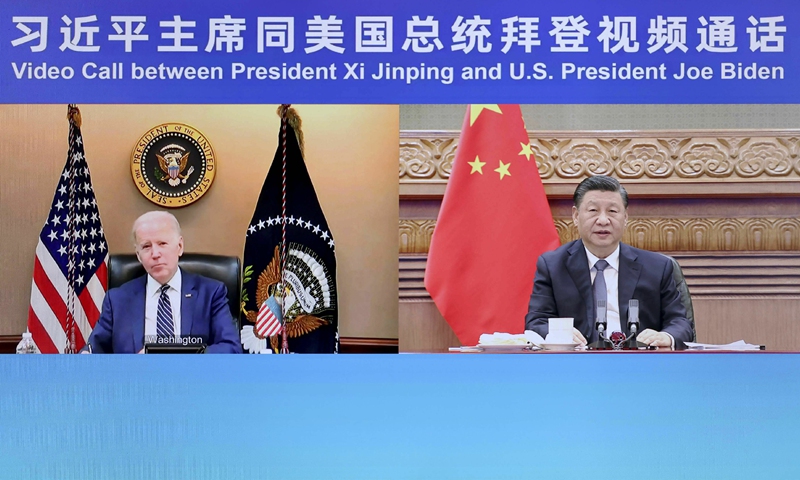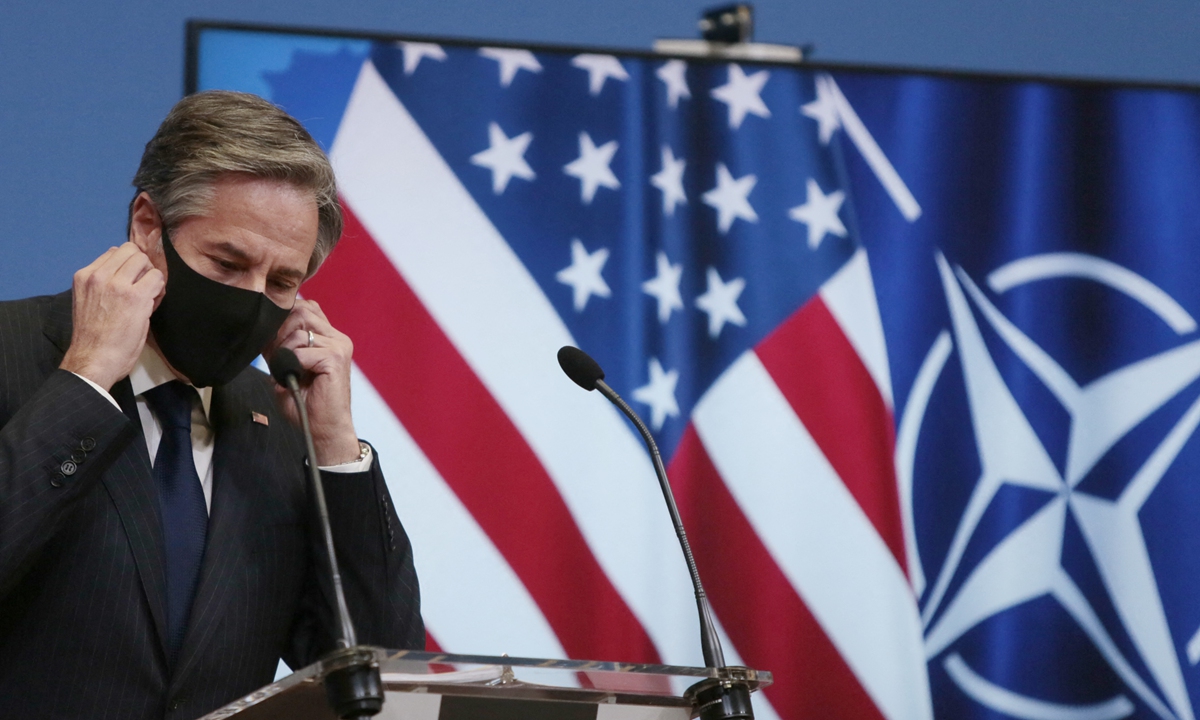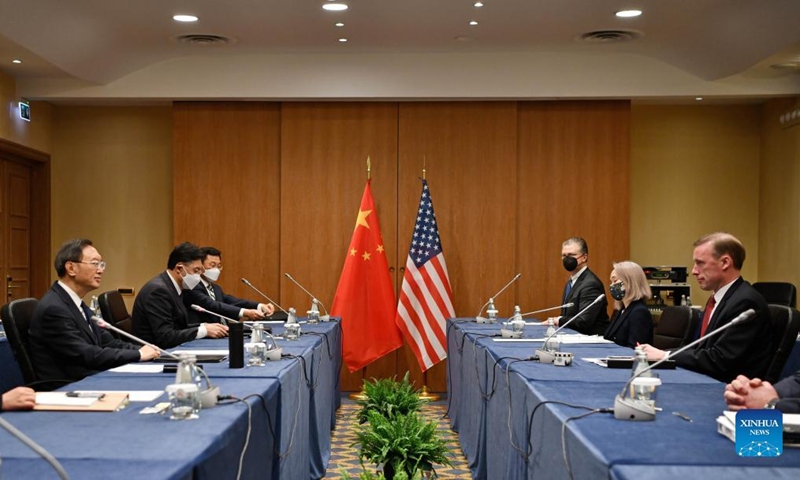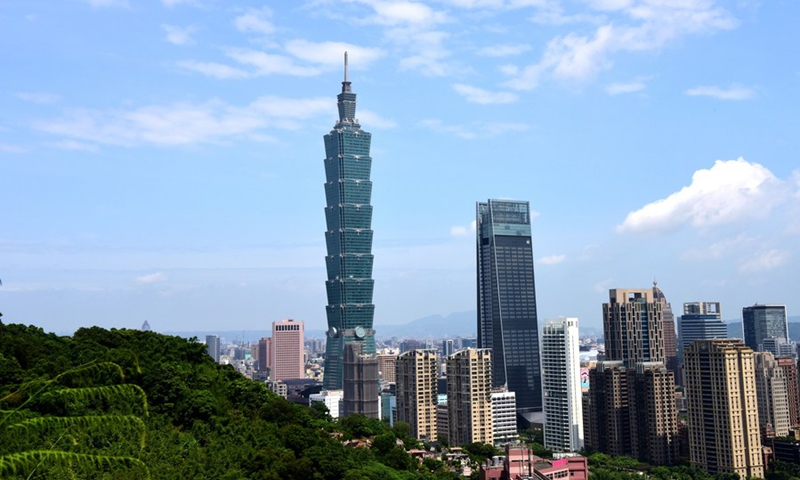
Chinese President Xi Jinping speaks with US President Joe Biden in a video meeting on Friday.Photo: Xinhua
Chinese President Xi Jinping encouraged the US and NATO to have conversations with Russia to solve the problems behind the Ukraine crisis, and expressed opposition to indiscriminate sanctions, during his video meeting with US President Joe Biden on Friday.
The Ukraine crisis is not something we want to see, and the events again show that countries should not come to the point of meeting on the battlefield. Conflict and confrontation are not in anyone's interest, and peace and security are what the international community should treasure the most, Xi said.
After Biden said the US does not seek a new Cold War, changes in China's system, a stronger alliance against China, supporting "Taiwan secessionism" or conflict with China, Xi said he takes the remarks very seriously.
On China-US relations, Xi said the direct cause for the current situation in the China-US relationship is that some people on the US side have not followed through on the important common understanding reached by the two presidents and have not acted on Biden's positive statements. The US has misperceived and miscalculated China's strategic intention.
The meeting lasted nearly two hours, and both Xi and Biden agreed that it was constructive, and urged working groups on both sides to take concrete actions to bring bilateral relations back to the right track and make respective efforts in solving the Ukraine crisis.
President Xi has focused on the big picture - instead of merely talking about the Ukraine crisis. He stressed China's overall views on security and diplomacy and reiterated our principles, Lü Xiang, a research fellow at the Chinese Academy of Social Sciences, told the Global Times.
President Xi's remarks on the Ukraine crisis have comprehensively declared China's stance and by standing at a higher level, he encouraged peace talks between Ukraine and Russia, and talks between the US, NATO and Russia, Lü said, noting that some US senior officials' aggressive pressuring toward China had never affected China's own pace.
"I think the Friday talk is not only meaningful for the China-US relations, but also for the global geopolitical situation. The Chinese leader's remarks showed countries closely following the US in inciting a crisis what a responsible major power should do in facing with problems," said Lü.
President Xi also made remarks on the Taiwan question. Lü said that these are signals to the US - if it keeps playing with fire on the Taiwan question and violates China's core interests, there will be no friendly or positive interactions between China and the US.
The Ukraine crisis is already a headache for the US and it will not like more confrontations with China. The US and its politicians should abandon the fantasy that they could solve all problems by imposing sanctions or coercion as it is impossible to solve global problems, including political crises or economic issues without China and Russia, Lü said.
Just hours before the meeting, China, in a rare move, sent tough signals, stating it will never accept US threats and coercion over the Ukraine issue and vowing to make a strong response if the US takes measures harming China's legitimate interests.
In an
exclusive interview with the Global Times, an anonymous Chinese official said China accepted the US' proposal for the phone call between the heads of the two countries on China-US relations and the Ukraine situation out of considerations of bilateral relations, promoting peace talks and urging the US to take right stance.
China will never accept US threats and coercion, and if the US takes measures that harm China's legitimate interests and the interests of Chinese enterprises and individuals, China will not sit idly by and will make a strong response, the official stressed, noting the US should not have any illusions or miscalculations about this.
China's strong signals were sent as the Biden administration has intensified its disinformation campaign over China's "military support" to Russia and attempted to threaten China with "dire consequences."

US Secretary of State Antony Blinken gives a press briefing at the end of a NATO Foreign Ministers' meeting at the Alliance's headquarters in Brussels, Belgium, 24 March 2021.
US Secretary of State Antony Blinken claimed that Biden will make clear during Friday's call that China will "bear responsibility for any actions it takes to support Russia's aggression, and we will not hesitate to impose costs," he told a media briefing.
Chinese analysts said China's clear statement on its stand is very necessary and timely, when the US seeks to manipulate Friday's talk to coerce China to change its diplomatic position, provoke China-Russia relations and smear China's image, which is sinister and vicious.
China is sending a stern warning to the Biden administration not to harbor any illusions of changing China in Friday night's talk, and is urging Biden to calm down on the practical issues of the two countries, analysts said.
Just days after the Rome meeting between senior Chinese diplomat Yang Jiechi and US National Security Advisor Jake Sullivan, the US reached out to China again for a higher-level meeting, which in some Chinese analysts' view reflected the US' growing anxiety over the uncontrollable consequences of the worsening Ukraine crisis, especially after its attempt to change China's position failed in Rome and the US is in dire need of China's help to deal with the chaos it created but failed to handle.
Friday's meeting is being made as the US is caught in double plight: worrying about possible nuclear conflict with Russia with its extreme pressure against it and the risk of a rapid escalation of conflicts with China over the Taiwan question, Chinese analysts said, noting the Taiwan question and the Ukraine issue will be high on the agenda of the exchange.
Behind the Biden administration's designed pressuring on China was its deep anxiety and pressing need for help from China on the Ukraine crisis, Li Haidong, a professor from the Institute of International Relations of China Foreign Affairs University, told the Global Times.
"Friday's meeting for the US is far more urgent than other issues Biden has dealt with since he took office. The exchange was held as the US, under extreme urgent circumstances, requested to have exchanges with China on Ukraine," Li said.
Some American media are also aware of the US' dilemma. In covering Friday's exchange, Bloomberg News said in its headline that, "Biden looks to China for help with Putin." An opinion piece for Bloomberg said the worse Russia does, "the greater the risks America and its European allies may face."
The Ukraine issue is the consequence of accumulated problems between the US and Russia or the US-led NATO's continuous pressuring and challenging of Russia's security, thus the US, deep inside, does not expect China to solve it, but it still wants to draw China into its mess or ask China to help it out since the current situation is beyond its expectations and it will become harder for the US to avoid being directly involved in it, Lü said.
Lü pointed out that Biden has been naïve for thinking that Russia will not fight back when faced with the US' provocations, and now he is using fuel to put out the fire in Ukraine while being afraid the fire will reach NATO.
However, the US on one hand is seeking China's help with the worsening Ukraine crisis that it created but failed to handle; on the other hand, it is pressuring and threatening China, which is typical American practice, Li said, noting that it is unwise and counterproductive.
"If the US harbors an illusion that China will yield to its pressure on the Ukraine crisis and China-Russia relations, it only reflects that the US has a too superficial understanding of current complex international situations and the right and wrong of facts," Li said.
Many of the US and West's sanctions against Russia were done purely via long-arm jurisdiction without permission from the UN. And such a practice of framing relations with other countries based on its domestic law and forcing third countries to accept it is undoubtedly contrary to the spirit of international law and the principles of the UN Charter,Chinese analysts said.

Yang Jiechi (1st L), a member of the Political Bureau of the Communist Party of China (CPC) Central Committee and director of the Office of the Foreign Affairs Commission of the CPC Central Committee, meets with U.S. National Security Advisor Jake Sullivan (1st R) in Rome, Italy, March 14, 2022.Photo: Xinhua
While trying to drag China into the mess the US created, Washington is also smearing China-Russia relations with rumors and disinformation to sow discord between the two.
After Sullivan warned China that it would "absolutely face consequences" if it helped Moscow evade sanctions, Russian Foreign Ministry Spokesperson Maria Zakharova denounced Sullivan's remarks on Thursday, saying it is another manifestation of Washington's imperialist and hegemonic ambitions. China-Russia relations have strong internal momentum, which are not affected by international changes, she said.
China and Russia have reiterated there is no military cooperation, and the high-level strategic partnership between the two countries has never targeted any third party, nor will it be affected by any third party. This is a key point that the US and the West never understand, analysts said.
China has developed bilateral relations with Russia and the US respectively and it does not use bilateral relations to target Russia or the US. Currently, the conflicts between the US and Russia and between China and the US all have roots in the US, and the US is trying to sow discord between Russia and China, Lü said, noting that this is why China has reiterated that the US' actions should fit its remarks.

Photo taken on July 21, 2019 from Xiangshan Mountain shows the Taipei 101 skyscraper in Taipei, southeast China's Taiwan. Photo:Xinhua
Explosive issue on China-US relations Mishandling of the Taiwan question will have a disruptive impact on the bilateral ties, and China hopes that the US will give due attention to this issue, Xi said in the video talk.
While driving Russia into a corner on the Ukraine issue, the US has also tried to drive China into a corner with the most "explosive issue" for bilateral ties - the Taiwan question, Yang Xiyu, a senior research fellow at the China Institute of International Studies, told the Global Times.
The US has been quickly advancing its Indo-Pacific strategy using Taiwan as its pawn, and kept sending wrong signals to Taiwan secessionists by sending former American diplomats to visit the island, which shows its conflict with China over Taiwan question is rapidly escalating, Yang said.
Some US officials also hyped the relevance of the Ukraine issue with the Taiwan question, but the two are fundamentally different.
Top US Air Force General Kenneth Wilsbach connected the situation in Ukraine with the question of Taiwan, claiming that one of the "key lessons" the Chinese are taking from the Ukraine situation is the "solidarity of the global community," and that if China behaves in a similar way against the island or another neighbor, "something more robust will happen."
If the US does not take seriously China's concern but just wants to seek China's help for its own purposes, such pattern of interaction would not work out but only inject more uncertainty into China-US relations, analysts warned.







